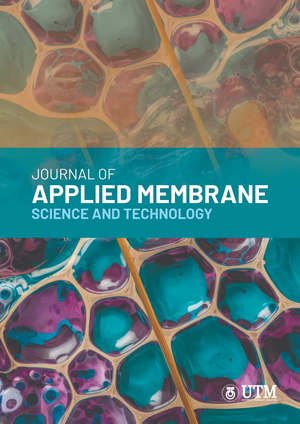About the Journal

The Journal of Applied Membrane Science & Technology (AMST), e-ISSN: 2600-9226 (Online), is an international, peer-reviewed, open-access journal published by the Advanced Membrane Technology Research Centre (AMTEC) at Universiti Teknologi Malaysia (UTM). Established in 2005, AMST has served the global membrane research community for over two decades, publishing more than 250 articles as of December 2025.
In 2026, AMST will enter an exciting new phase of development. Expanding beyond its original scope, the journal will now cover a broader spectrum of topics that complement and integrate with membrane technology. Alongside cutting-edge advances in membrane materials, processes, performance and applications, AMST will also welcome research on adsorption, absorption, photocatalysis, coagulation–flocculation and other advanced or emerging treatment methods that can work synergistically with membrane processes/systems to enhance removal efficiency, reduce fouling, improve permeance, minimize system footprint and lower energy consumption.
AMST aims to remain a leading international platform for the dissemination of high-quality research. The journal publishes original research articles, reviews, book reviews and scholarly discussions that offer insights into the latest scientific and technological advancements in membrane processes and integrated technologies. We particularly encourage submissions that introduce new theories, innovative technologies or practical applications, as well as well-designed experimental studies with rigorous analyses.
As an open-access journal, AMST provides unrestricted access to its content. All articles are freely available to readers worldwide, without subscription or access fees. Users are permitted to read, download, copy, distribute, print, search or link to the full text of the articles or use them for any other lawful purpose—with the condition that proper credit is given to the authors and publisher. This commitment to accessibility supports the global exchange of knowledge and promotes the advancement of membrane science and advanced/emerging technology.
Scope of the Journal
The Journal of Applied Membrane Science & Technology (AMST) welcomes high-quality submissions across a wide array of interdisciplinary fields related to membrane science, advanced separation technology and integrated processes. The journal encourages contributions spanning fundamental studies, experimental research and industrial applications in the following areas, among others:
- Chemical Engineering
- Chemistry (both organic and inorganic)
- Advanced Organic and Inorganic Material Development
- Composite Material Engineering
- Environmental Engineering
- Separation Processes and Technologies
- Nanotechnology and Nanomaterials
- Renewable Energy and Sustainable Systems
- Nutrient and Resource Recovery from Waste Streams
AMST is committed to fostering innovation and accelerating the development of membrane-based and integrated technologies that address real-world challenges in water treatment, environmental sustainability, energy efficiency and resource management.
Publication Frequency
The Journal of Applied Membrane Science & Technology is published online three times a year, with issues released in April, August and December.















